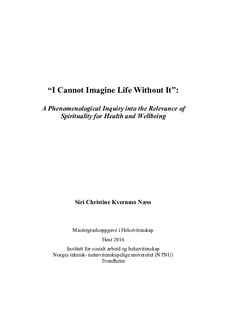"I Cannot Imagine Life Without It" - A Phenomenological Inquiry into the Relevance of Spirituality for Health and Wellbeing
Master thesis
Permanent lenke
http://hdl.handle.net/11250/2478422Utgivelsesdato
2016Metadata
Vis full innførselSamlinger
- Institutt for sosialt arbeid [1393]
Sammendrag
The interest in the dynamics between spirituality, health and wellbeing has virtually exploded in the last few decades, and a growing amount of research convey that there is an important link between spiritual factors and health status. However, more research is needed to gain a better understanding of this relationship - the multifaceted and elusive nature of spirituality poses definitional challenges, and central elements both overlaps with, and differs from, religion. Thus, the research field reflects both controversy and confusion with regard to conceptualization and measurement, which challenge the pertinence of findings. This study explores the lived experience of spirituality as it relates to health and wellbeing, and aims to identify some of the mechanisms mediating the spirituality-health relationship. Semistructured interviews were conducted with 10 women regarding the importance of their experiences with spirituality for health and wellbeing. The interviews were transcribed slightly verbatim mode, and further analysed within the transcendental phenomenological framework. Four major themes emerged as descriptors of the meaning and relevance of spirituality for health and wellbeing: Understanding Spirituality, Coping and Empowerment, Physical Impacts and The Self and Society. The participants’ understanding of spirituality is comprised of four dimensions: as a process of rediscovery, as broader than religion, as mediated by transcendent experiences and spiritual practices. Coping and empowerment highlight spirituality as a psychological resource through seven pathways: power of perception, strength and calmness, spiritual surrender, existential meaning, trust and protection, self-improvement and helping others. Both positive and negative physical impacts are illuminated. Moreover, the findings suggest that spirituality functions as a nexus between personal and social wellbeing, promoting authenticity, critical thinking, social tension, doubt and the need for plausible explanations. Included is an in-depth description and a discussion of the findings, as well as suggestions for health-care practitioners and directions for future research.
